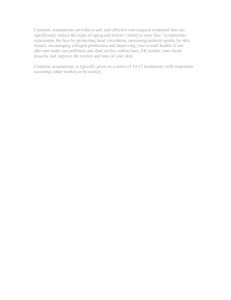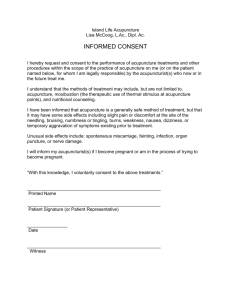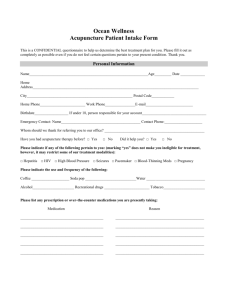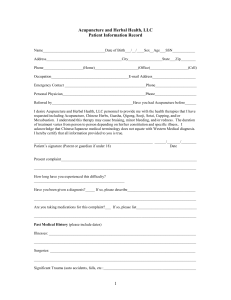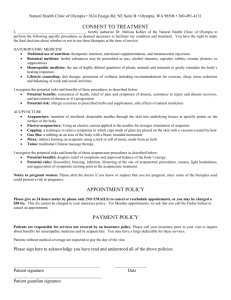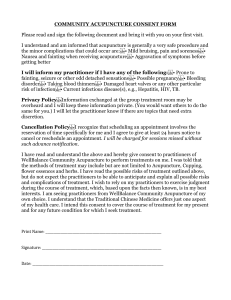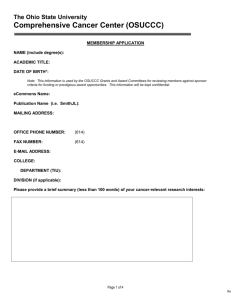(Schedule)(2009-10-13) - Journal of Integrative Medicine
advertisement
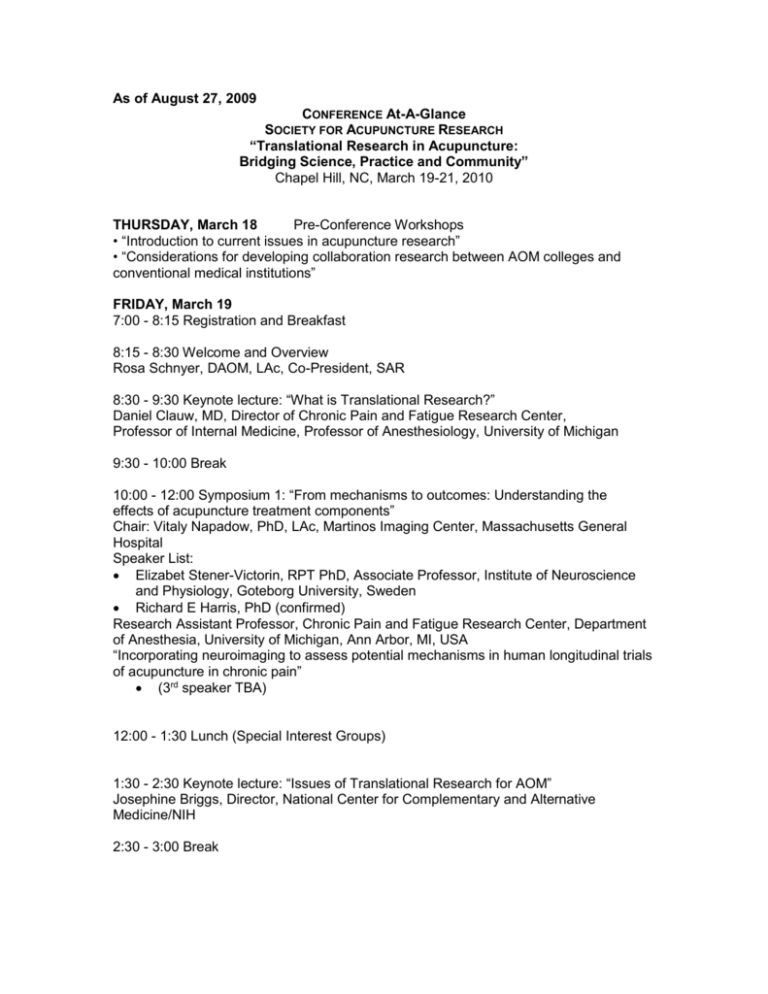
As of August 27, 2009 CONFERENCE At-A-Glance SOCIETY FOR ACUPUNCTURE RESEARCH “Translational Research in Acupuncture: Bridging Science, Practice and Community” Chapel Hill, NC, March 19-21, 2010 THURSDAY, March 18 Pre-Conference Workshops • “Introduction to current issues in acupuncture research” • “Considerations for developing collaboration research between AOM colleges and conventional medical institutions” FRIDAY, March 19 7:00 - 8:15 Registration and Breakfast 8:15 - 8:30 Welcome and Overview Rosa Schnyer, DAOM, LAc, Co-President, SAR 8:30 - 9:30 Keynote lecture: “What is Translational Research?” Daniel Clauw, MD, Director of Chronic Pain and Fatigue Research Center, Professor of Internal Medicine, Professor of Anesthesiology, University of Michigan 9:30 - 10:00 Break 10:00 - 12:00 Symposium 1: “From mechanisms to outcomes: Understanding the effects of acupuncture treatment components” Chair: Vitaly Napadow, PhD, LAc, Martinos Imaging Center, Massachusetts General Hospital Speaker List: Elizabet Stener-Victorin, RPT PhD, Associate Professor, Institute of Neuroscience and Physiology, Goteborg University, Sweden Richard E Harris, PhD (confirmed) Research Assistant Professor, Chronic Pain and Fatigue Research Center, Department of Anesthesia, University of Michigan, Ann Arbor, MI, USA “Incorporating neuroimaging to assess potential mechanisms in human longitudinal trials of acupuncture in chronic pain” (3rd speaker TBA) 12:00 - 1:30 Lunch (Special Interest Groups) 1:30 - 2:30 Keynote lecture: “Issues of Translational Research for AOM” Josephine Briggs, Director, National Center for Complementary and Alternative Medicine/NIH 2:30 - 3:00 Break 3:00 - 5:00 Symposium 2: “Bridging basic science and effectiveness trials: The challenge of designing effective sham controls – a missing link” Chair: Richard Harris, PhD, LAc, University of Michigan Speaker list: Ted Kaptchuk, Associate Professor of Medicine and Lecturer on Social Medicune, Harvard University Medical School, Cambridge, MA “Medical imaging differences between real and sham acupuncture” Jongbae Park, KMD, PhD, L.Ac, Assistant Professor, University of North Carolina at Chapel Hill, Physical Medicine and Rehabilitation "Non-Penetrating Sham Control: Its 10 year Experience?” Konrad Streitberger, Department of Anesthesiology, University of Heidelberg 5:30 -7:00 Poster Session 1 Wine and cheese reception SATURDAY, March 20 7:00 - 8:30 Breakfast 8:30 - 9:30 Keynote lecture: “Translating Chinese Medicine into Contemporary Health Care Contexts” Volker Sheid, PhD, MBAcC, European Institute of Oriental Medicine, UK 9:30 - 10:00 Break 10:00 - 12:00 Oral Presentations 1 (8 x 15 minutes each) 12:00 - 1:30 Lunch Lecture: “Whole Systems Research: Concepts and Strategies” Richard Hammerschlag, PhD, Dean of Research, Oregon College of Oriental Medicine, Portland, OR 1:30 - 3:30 Symposium 3: “Assessing acupuncture effectiveness in the ‘real world’” Chair: Hugh MacPherson, PhD, MBAcC, University of York, Department of Health Sciences, Heslington, York, UK Confirmed speakers: Peter Wayne, PhD, Assistant Professor of Medicine, Director, Tai Chi and Mind Body Research Programs, Harvard Medical School, Division for Research and Education in Complementary and Integrative Medical Therapies “Tai Chi for osteopenia (low bone density): a pragmatic study” Volker Scheid: “Chinese Herbal Medicine For Menopause: Interdisciplinary Action Research” Richard Hammerschlag: “Traditional Chinese medicine for temporomandibular dysfunction: a whole systems multi-site trial” Hugh MacPherson: “Acupuncture For Irritable Bowel Syndrome: Effectiveness In Routine Practice” 3:30 - 4:00 Break 4:00 - 6:00 Oral Presentations 2 (8 x 15 minutes each) 6:00 - 7:30 Poster Session 2 Wine and cheese reception SUNDAY, March 21 7:00 - 8:30 Breakfast 8:30 - 12:00 Workshop Led by Rosa Schnyer, DAOM, LAc, C-President, SAR “A Field Guide to Translational Tools”: This interactive symposium will include 3 stimulating sessions: 1) How to Build a Better Outcome Measure: Using technology to solve research problems (8:30 – 10:00 am) – Accurately and objectively measuring the complex and dynamic interactions that occur during acupuncture is challenging. This session will include 8 ten-minute presentations from researchers who will share examples of how the innovative use of technology has improved their research. 2) Hold Me, Touch Me, Use Me: Hands-on interactive technology demonstrations (10:15 – 11:30 am) – attendees will visit stations showcasing the technologies featured in the Session 1. Attendees will be able to scrutinize, handle, and experiment with the tools. Researchers will be available to interact and answer questions. 3) Supporting Partnerships for Innovation: The NCCAM SBIR Program (11:30 – 12:00) – a major presenter will describe how the SBIR program fosters innovation by supporting partnerships between researchers and small businesses. Research innovations often stem from or lead to technology innovations with applications far beyond the lab. This is translational research at its best, impacting the clinic and the community at large. Examples of Technologies to be featured in Sessions 1 and 2: Measure Your Medical Outcome Profile (MYMOP) – a validated, patientgenerated measure allowing patients to identify and track symptoms, medications, and overall well-being over time. Acusensor – sensor technology allowing acupuncturists to measure needling manipulations, including motion and forces induced while needling. This allows the needling component of treatment to be quantified, documented, and controlled. Ultrasound imaging – allows real-time visualization of needle/tissue interaction during needle insertion and manipulation. Mini-Mitter Vital Sense XHR – wireless physiological monitor measuring heart and respiratory rates. Allows researchers to document changes in autonomic functions. TEAMSI-TCM: The Traditional East Asian Medicine Structured Interview (TCM version) - a semi-structured diagnostic interview for use in clinical trials of Chinese medicine. Allows researchers to systematize the assessment process, collect relevant data, and improve the reliability of the TCM style of differential diagnosis. 12:00 - 12:30 Awards and closing remarks: Richard Harris, PhD, LAc, Co-President, SAR
